Publications
Articles, publications, books, tools and multimedia features from the U.S. Institute of Peace provide the latest news, analysis, research findings, practitioner guides and reports, all related to the conflict zones and issues that are at the center of the Institute’s work to prevent and reduce violent conflict.
Nepal in Transition: Developing Security and Rule of Law Strategies
In February 2007, USIP facilitated a series of dialogues between civil society, the Nepal police, and representatives of political parties to identify areas of mutual concern related to security and the rule of law in Nepal. This USIPeace Briefing presents a list of high-priority issues developed as a result of these meetings.
Options for Police in a U.S. Civilian Reserve Corps
In the State of the Union address this year, President Bush joined calls for a U.S. civilian reserve corps. In mid-2006, USIP convened federal law enforcement officials and chiefs of police from across the United States to examine the range of choices for creating the police component of a civilian reserve corps that could rapidly deploy to states emerging from conflict.
Is Iran Facing an Economic Crisis?
Western policy toward Iran relies heavily on economic pressure, and Iran's political trajectory is shaped in large part by its economic prospects and constraints. What is the state of the Iranian economy? The Iran Policy Forum tackled this question in their latest meeting.
Public Health and Conflict Series: Rebuilding a Nation's Health in Afghanistan
Since the Soviet invasion of 1979, Afghanistan's health system has been decimated by over 27 years of near constant conflict. What steps are necessary to ensure that quality health care is delivered to all of Afghanistan's citizens?
On the Issues: Bangladesh
Christine Fair explains how Bangladesh's current problems stem from decades of failed governance and rule of law.
Constitution-Making Web Links
Below are links by topical categories to resources primarily in English providing information on constitution-making processes and the role of public participation. General Resources National Constitutional Assemblies Non-Governmental Organizations and Constitutional Studies Selected Documents and Decisions These links complement the following Institute Special Reports: (1) Democratic Constitution Making, and (2) Iraq's Constitutional Process: Shaping a Vision f...

Personal Transformations: Moving from Violence to Peace
Behavioral scientists have devoted considerable attention to religious extremism and the psychological factors that contribute to an individual’s propensity toward violence. However, relatively little data are available on those who abandon extremism and become proponents of conciliation and peace. Dr. Renee Garfinkel offers a number of tentative conclusions about individuals she has interviewed who have made this transition.
The Situation in Afghanistan: A Re-evaluation Needed
Taliban fighters have re-emerged in full force and insurgency-related violence has increased to record levels in Afghanistan in 2007. The conflict, which has been pushed down on the U.S. and international agendas, is now re-emerging and calls for a strengthened a plan of action.
Prospects for a Successful Peace Process in Nepal: Internal and International Perspectives
On November 21, 2006, Nepal's government and the Communist Party of Nepal signed a comprehensive peace agreement to formally end their ten-year conflict, which has resulted in an estimated 13,000 deaths. The agreement has been widely hailed as historic and many observers feel cautiously optimistic, in spite of the hurdles that lie ahead. What are the challenges Nepal faces during the peace process?
New Strategies for Darfur
While the humanitarian and security crises continue in Darfur, there have been some improvements in recent weeks, including the decrease in civilian casualties. However, in the first two months of 2007, 80,000 people were forced from their homes because of violence. How can the international community help enhance peacekeeping in Darfur?